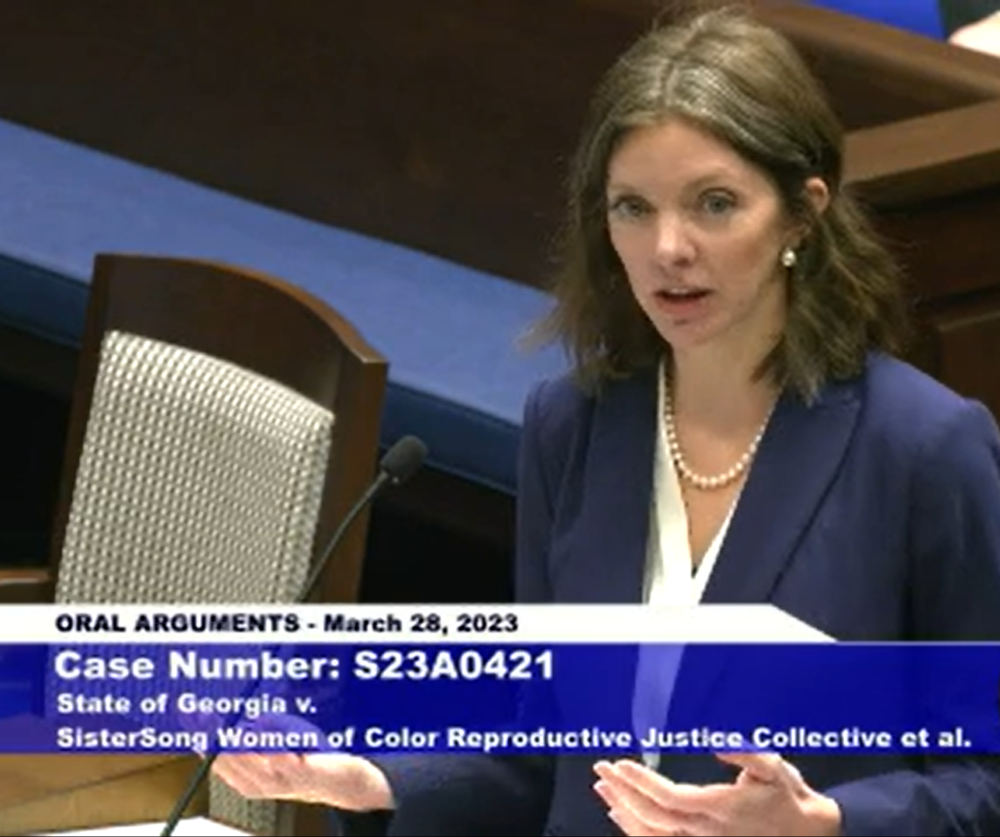
Caption
Julia Stone, attorney for the plaintiffs, argues before the Georgia Supreme Court on March 28, 2023.
Credit: Georgia Supreme Court
State Supreme Court justices heard arguments from both sides on Tuesday in a case that bring into question the constitutionality of Georgia's abortion law, which currently bans abortions past about six weeks of pregnancy.
The lawsuit, filed against the state by SisterSong Women of Color Reproductive Justice Coalition and others, claims Georgia’s abortion law is void because when it passed in 2019, the right to abortion was still protected under the U.S. Constitution.
Statements heard by Georgia Supreme Court justices on Tuesday from both sides of the litigation focussed on the void ab initio argument, which means “void from the beginning.”

Julia Stone, attorney for the plaintiffs, argues before the Georgia Supreme Court on March 28, 2023.
“The fact is that for 50 years, states were not allowed to enact these, that Roe and Casey were the law of the land.” said Julia Stone, counsel for Sistersong and others, referencing state abortion bans. “Voidness is not something that can change over time.”
But Solicitor-General Stephen Petrany, representing the state, claims that argument doesn’t stand following the U.S. Supreme Court's Dobbs decision to overturn Roe v. Wade.
“There are few principles in Georgia law more venerable than the fundamental principle that a constitutional provision means today what it meant at the time that it was enacted,” Petrany said. “That means that because the Life Act would be valid if enacted today, it was valid when it was enacted.”
A few court justices questioned the viability of Stone's arguement, including Justice Charles Bethel.
"Dobbs expressly says the prior precedent was wrong," Bethel said. "And I mean, whether anybody agrees with that, it says that and it's the last word on that."
The court has promised a ruling as soon as possible.
Outside the courthouse in Atlanta after arguments, Stone said if this decision doesn’t go their way, opponents will be back to argue against House Bill 481 on the basis of privacy guaranteed under the Georgia Constitution, and whether that includes access to abortion care.
“The fight continues,” Stone said.
The lawsuit was filed in the Superior Court of Fulton County last July in response to the state’s immediate enforcement of the 2019 abortion law, shortly after the Supreme Court’s decision.
In October, Superior Court Judge Robert McBurney heard arguments on the case and filed a decision to block HB 481, stating the bill was unconstitutional when it passed and the state would need to pass a new abortion law.
McBurney’s decision made most abortions up to 22 weeks of pregnancy legal again.
But just eight days later, an emergency stay on McBurney’s injunction from the Georgia Supreme Court reinstated the six-week ban until the case is resolved.
During a press conference following Tuesday’s arguments, plaintiffs and advocates pointed to the effects HB 481 has had on both patients and providers.
“This abortion ban has forced Georgians to travel across state lines to seek essential health care at great expense or to continue their pregnancies against their will,” said Monica Simson, executive director of SisterSong.
Kwajelyn Jackson of Feminist Women’s Health Center in Atlanta called ongoing efforts by state legislatures to “interfere” with abortion care, “deplorable.”
“I am exhausted in this moment,” Jackson said. “I am tired of all the ways that we have had to prove our humanity, the ways that we have had to fight for our dignity, to make sure that our community has the things that they need.”
Meanwhile, abortion providers are on standby awaiting a decision from another court case in Texas that could result in nationwide changes in access to medication abortions, specifically mifepristone.